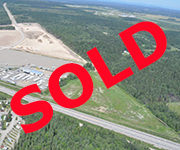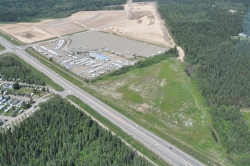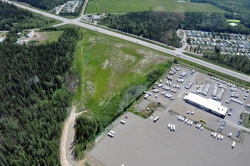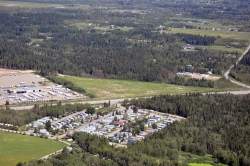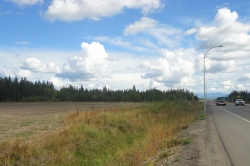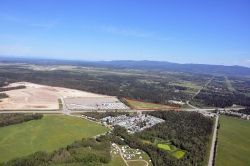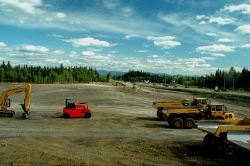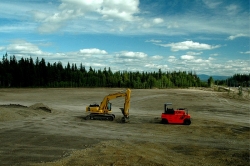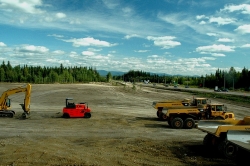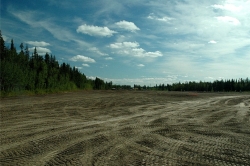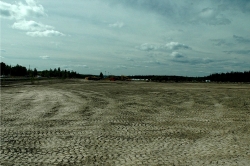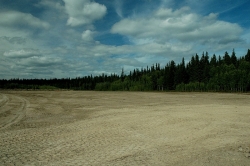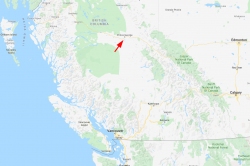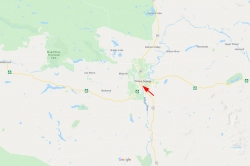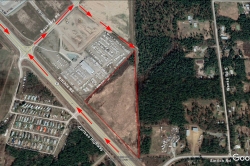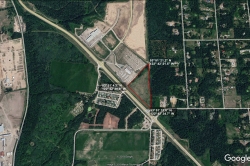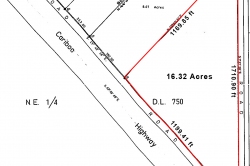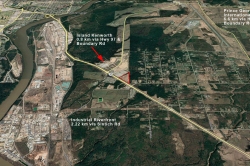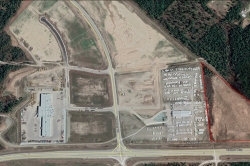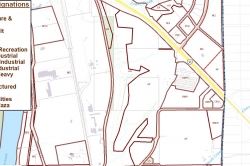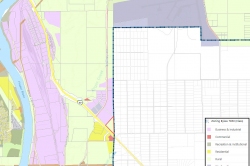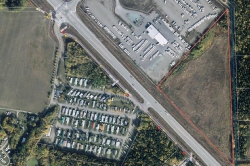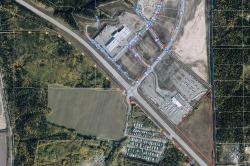16 Acres, Prince George
| Listing Number: | PG100 |
|---|---|
| Size: | 16 Acres |
| Map Reference: | 93G |
| Price: | SOLD |
| Legal: | Lot 1, Plan PGP16725, District Lot 750, Cariboo Land District PID: 003-650-162 |
| Description: | The property is level and flat and triangular in shape. It has approximately 1,199 feet ( 365 meters)) of frontage on Highway 97 and has a perpendicular depth of approximately 1,160 feet (354) meters). Fraserway RV Sales is adjacent and to the left of the property on Highway 97. The road to the Prince George airport is to the right of the property on Highway 97. There are new commercial and industrial properties (Global Logistics Park) to the west and northwest of the property including the new 100,000 sq.ft. Inland Kenworth facility. This is an ideal property for investment. & development. |
| Location: | Prince George is located in central British Columbia approximately 491 miles (790 km) north of Vancouver The property is located within the Prince George city limits on the north side of Highway 97 S, east of Boundary Road between Fraserway RV Sales and the Airport turn-off (Sintich Road). The property is approximately 10 km (6 miles) south of downtown Prince George and approximately 6 km (4 miles) southwest of the Prince George international Airport (YXS). The property is east of the Danson, BCR, and Great West industrial areas. The Danson area is south of the BCR Industrial area, which adjoins the Great West industrial area. This is the largest combined industrial area in Prince George and consists of both light and heavy industrial uses. There is also a broad mix of industrial related uses such as service stations, sales, transportation, light manufacturing, as well as heavy manufacturing, and sawmills. |
| Access: | From Prince George city center head south on the Highway 97 towards the Prince George Airport. Turn Left onto Boundary Road and right onto the backroad behind Fraserway RV. Access to the property is via a dirt/gravel backage road along the north boundary of the subject, via Boundary Road. There is also an undeveloped road right of way along the east boundary of the property. The length of the backage road from Boundary Road to the northern tip of the subject property is approximately 400 meters (1,312 ft) Prince George Airport is the regional airport for Northern B.C. and plays a key role in the economic development of the area. The airport has undergone a major expansion, with further renovations to its runways, and international cargo plane fueling capacity, and can now accept large body airplane landings. This comes as a result of a runway expansion, increasing the length of runway 15/33 from 7,400 ft (2,300 m) to 11,450 ft (3,490 m), making it the third longest runway in Canada. The airport has an International Customs and Canada Border Service area and accepts international charter flights. It is also anticipated that the runway expansion will attract international air-freight traffic and cargo transfers and will be tied into the inland container activity. The CN Rail mainline between Prince George and Prince Rupert has been upgraded for the extra traffic with the new super port. Transportation through Prince George has increased with the large role that Prince Rupert now takes as a “New World Port”. This has created a major transportation gateway from Asia to North America. The new world-class container port has been a great success and is a major distributor for intermodal traffic moving between Asia and central North America, either destined to or from Canada or the mid-west United States. Containers started arriving in Prince George in October 2007. A 20 million dollar renovation to an existing facility on 1 Avenue in Prince George was completed in October 2007. |
| Recreation: | Prince George is a convenient central base for a wide range of outdoor pursuits – from lake and river fishing for trout, char, salmon, steelhead, Dolly Varden, whitefish, sturgeon, and grayling, to canoeing, kayaking or boating on nearby lakes, to wildlife watching for black and grizzly bear, elk, mountain goats and sheep, caribou, wolves, deer and moose. Visit Tabor Mountain to enjoy wildlife viewing on it’s 407 km (253 miles) multi-use recreational extensive trail system. In the winter, downhill skiers and snowboarders head for Purden Ski Village, Tabor Mountain Resort, Powder King Mountain Resort and Hart Highlands Ski Hill. Cross-country skiers can find beautiful spots to ski just about anywhere in the area, including the Otway Nordic Ski Centre, Fort George Park, Cottonwood Island Nature Park or an overnight ski on abandoned logging roads to Raven Lake. In the summer, ski trails turn into beautiful hiking and mountain biking routes. Golfers can choose from the five 18-hole courses in the Prince George area. Prince George has all the amenities of a large city. You can watch live performances at Theatre NorthWest and the Prince George Playhouse, and the Prince George Symphony Orchestra celebrates its 50th season in 2020. There are art galleries, multiple museums, and live music acts at the CN Centre. For sports fans, Prince George is home to the Prince George Cougars of the WHL, the Spruce Kings of the BCHL and the UNBC Timberwolves. |
| Services: | Dirt/Gravel access road. Paved road, street lighting, and storm ditches along Highway 97. Telephone/cable, hydro, natural gas, and municipal water, sanitary sewer at Boundary Road, approximately 0.4 km east of subject property. As this property is within Prince George boundaries, there is police and fire protection services available. |
| Area Data: | Prince George, B.C.’s northern capital, is located approximately 50 km (31 miles) east of the geographical centre of BC, at the confluence of the Fraser and Nechako Rivers. It is the commercial and industrial centre of the region and a major transportation hub with intersections of major road, rail and air routes. Distances: Vancouver (Highway 97 South): 790 km (491 miles) Dawson Creek (Highway 97 North): 410 km (255 miles) Fort St. John (Highway 97 North): 456 km (283 miles) Vanderhoof (Highway 16 West): 90 km (56 miles) Prince Rupert (Highway 16 West): 750 km (466 miles) Jasper, Alberta (Highway 16 East): 376 km (234 miles) Edmonton, Alberta (Highway 16 East): 750 km (466 miles) The logging & softwood pulp industry was responsible for Prince George’s explosive growth in the late 60’s – early 70’s and its population demanded a full service city. Prince George has all the facilities one would expect from a city its size: a new university built in 1994, a civic centre complex, parks, museums and art galleries. Prince George’s economy has shown diversification in various other areas and while forestry remains its’ foundation, there are other areas that make significant contributions to the economy. Renovation of an 84,000 square foot building and intermodal facility was complete in October 2007, to be utilized for stuffing containers returning to the Pacific Rim through the new 500 million dollar container port in Prince Rupert. Container traffic through Prince Rupert and has shown increasing traffic trends, and an expansion of the facility in August 2017 will almost double the capacity of shipments. Oil and gas exploration is being conducted in the Nechako Basin, and mining has taken a major role in the Central Interior. Prince George is the service and supply hub for mining industry, which has created a large increase in demand for industrial properties. Prince George is regarded as a good area for investment which is evident by local and out of town investors. There have been numerous new industrial buildings constructed over the last 5 years. The most significant projects are the Freightliner building, Pacific Bio Energy Pellet Plant, Wajax building, Peterbuilt building and Inland Kenworth buildings. Finning has also completed some major expansions in anticipation of a very busy industrial sector over the next decade. It is anticipated that the Site C mega-project in Fort. St. John will have a profound effect of rejuvenating the Central Interior, Peace and West sectors of the province |
| History: | Prince George, originally Fort George, was founded by George III, the reigning sovereign. The Carrier Indian name for this junction of the Nechako and Fraser Rivers was “Thle-et-leh” meaning “the confluence”. The history of the Prince George area focuses on its two rivers. Trappers and explorers used the rivers as transportation routes into the northern reaches of the province. When they discovered that the region was rich in wolf, fox, lynx, mink, wolverine, otter, and muskrat furs, forts and trading posts were quickly established near rivers and lakes so that furs could be sent out and supplies could be brought in. In 1821 the two major fur-trading companies, NorthWest and Hudson’s Bay, amalgamated and Fort George was operated as a Hudson’s Bay Company post until 1915. At this time the first civic elections were held and Prince George was chosen over Fort George for the name of the new city. In 1920 there was a real estate boom in anticipation of the Grand Trunk Pacific Railway’s arrival. By 1951 Prince George was connected with Dawson Creek and the Alaska Highway and in 1958 the Pacific Great Eastern Railway reached town. Hundreds of sawmills started cutting local timber, and Prince George became the self-proclaimed “Spruce Capital of the World”. The Yellowhead Highway connected the city to Edmonton in 1968, three pulp mills opened and all sorts of businesses flooded in. In 1974, amalgamation with outlying areas created the current 126 square miles within city boundaries. Since then the population has increased at a rapid rate to become the third largest city in British Columbia. In 1994 the University of Northern B.C. was officially opened. The 1990’s brought in the first of the large retail “Box Stores” with 2003 having the latest Westgate development containing Walmart, Canadian Tire and Home Depot. The University Hospital of Northern British Columbia (formerly Prince George Regional Hospital) received a major expansion, which was completed in 2003. The cancer clinic and new Kordyban Lodge was completed in 2013. There are 7 Sawmills and 3 Pulp Mills who are the major forestry employers. Other industries include two chemical plants, an oil refinery, brewery, machine shops, value added forestry and special equipment manufacturing. |
| Vegetation: | The majority of the property is level and has been cleared. There is a buffer of trees and vegetation along the west boundary. |
| Boundaries: | Iron pins and wooden stakes mark the boundaries. |
| Taxes: | $10,577.95 (2020) |
| Zoning: | The property is zoned Rural AF, Agriculture & Forestry, Prince George Zoning Bylaw 7850. Principal uses include general agriculture and foresty, housing and animal services, with secondary uses including agri-tourist accomodation, major auction, and home businesses. This property is not in the ALR. The highest and best use of the property is rezoning to allow for either highway commercial (Z10) or light industrial (M1 or M2) which is considered to maximize profitability.
|
